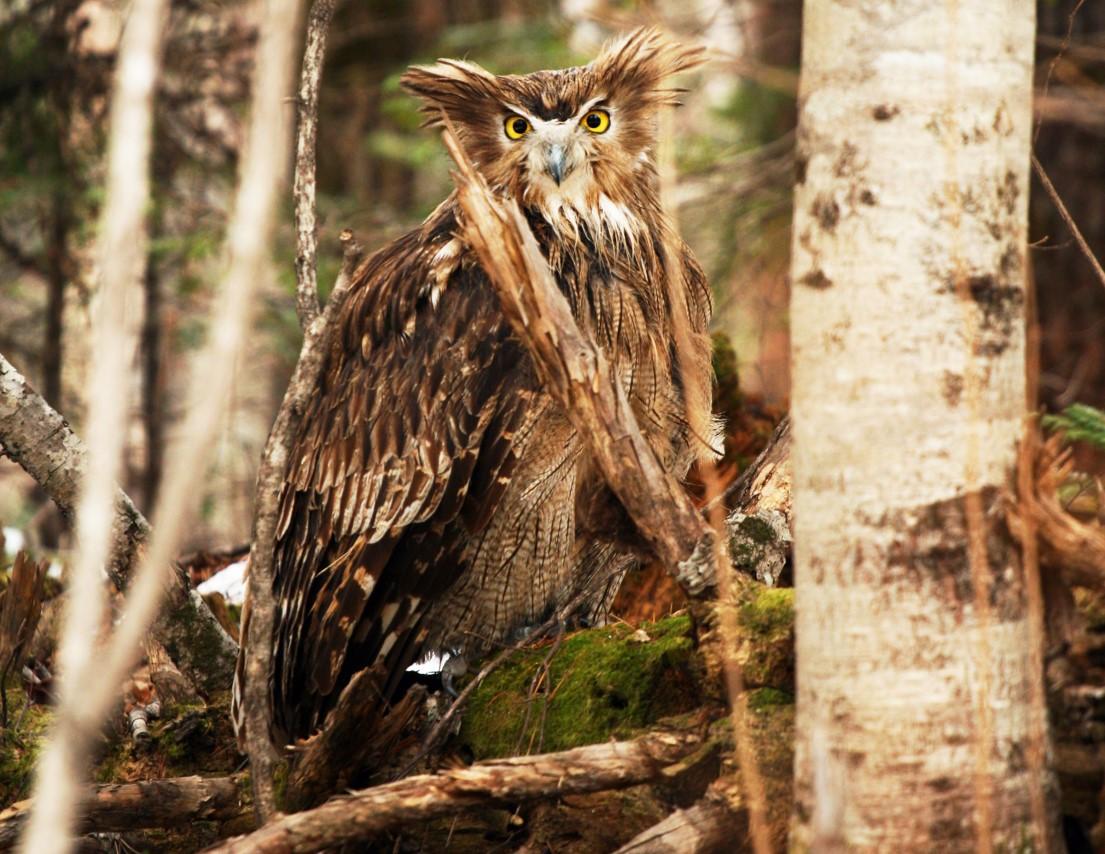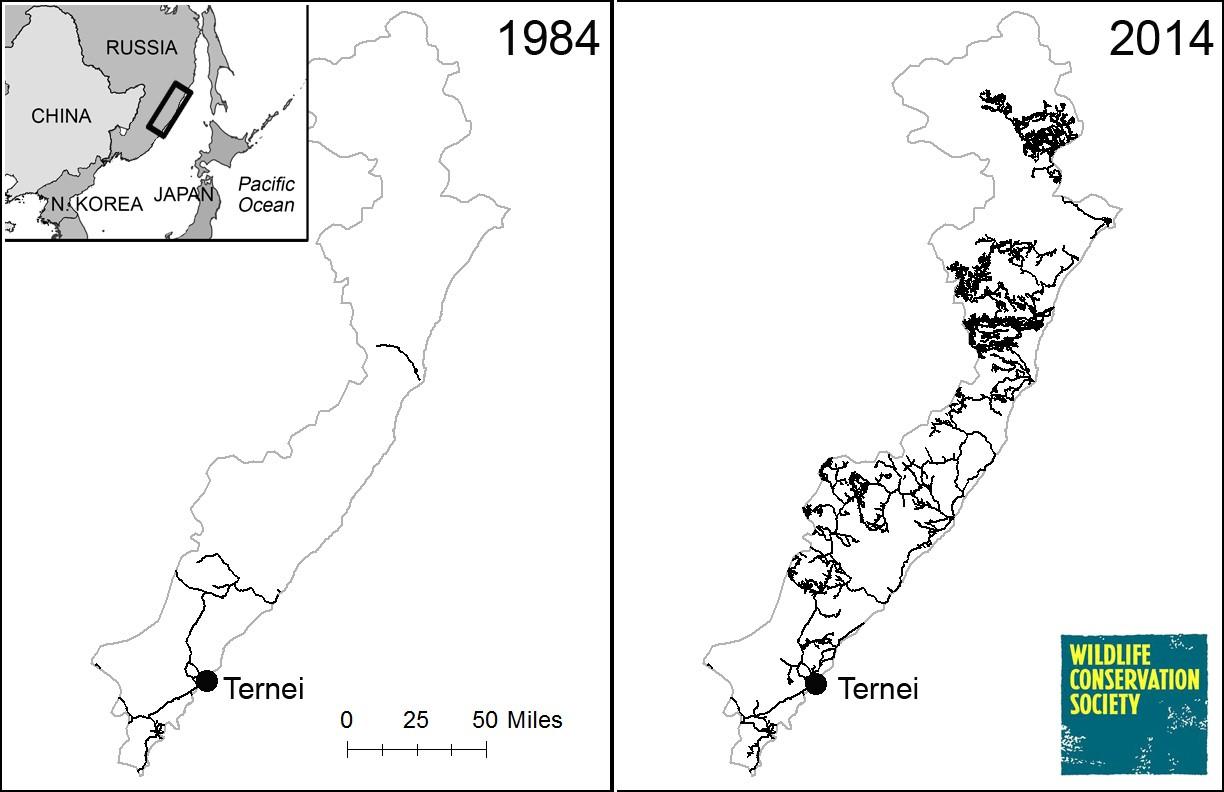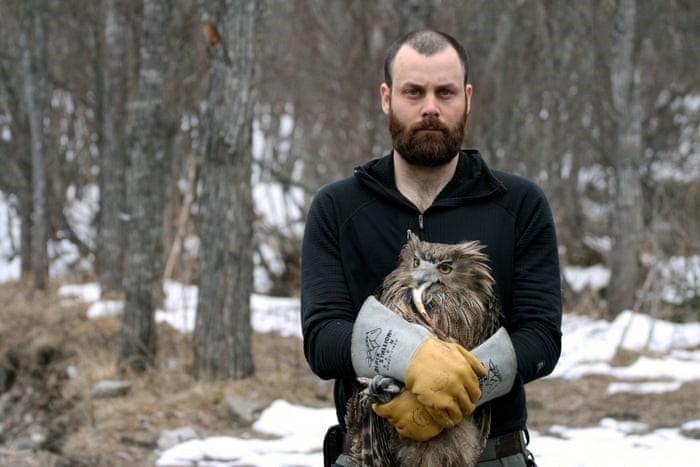
6 minute read
Big Owls, Big Problems: A Spotlight on Russias Conservation Problem
Big Owls, Big Problems
A Spotlight on Russia’s Conservation Problem
By Christina Gonzalve
Deep in the far eastern taiga forests of Russia, a figure looms silently over a noisy, rushing river. At first glance, the mysterious creature may be mistaken for something more mystical and otherworldly. A sharp breeze cuts through the coniferous trees and powders the stoic figure in sugary snow. Suddenly, the beast lunges into the air and plunges feet-first into the river. The creature struggles to shore, its nearly seven-foot-long wings flailing. This is the Blakiston’s fish owl, the largest living species of owl in the world (Hance, 2016). Just like the taiga forests, these owls are quickly disappearing. Blakiston’s fish owl can be found all along the eastern coast of Russia but they are highly
Blakiston’s fish owl. concentrated near the Samarga River in Primorye, the (Jonathan Slaght/WCS Russia) southernmost region of the country. As their name suggests, fish owls mainly eat fish, though they may occasionally prey on small animals such as mice or frogs. Fish owls like to build their nests in hollow, old-growth trees near rivers or streams. These majestic birds of prey produce only one or two eggs during a typical breeding season. Due to increased logging and fishing in the area, the fish owl population has dropped to about 1000 breeding pairs (Hance, 2016). If the species has any hope of recovery, it starts with acknowledging Russia’s muddled problems with conservation. While about half of Russia’s land is composed of forest, the country is currently the number one exporter of timber worldwide (Flintoff, 2013). From above, Primorye’s boreal forests reveal fresh scars where logging vehicles barrel through the landscape to strip the Blakiston’s fish owls of their old-growth homes. For years, the logging industry has been encroaching onto fish owl territory. However, loggers may not pose the greatest threat in terms of habitat destruction. There may be bigger fish to fry. The new logging roads that trace through the Primorye landscape do more than just serve the logging industry. They are an invitation for the illegal harvest of leftover trees and other natural resources. According to President Putin in 2013, the persistent demand for timber has increased illegal logging by about 70%. This presents a growing threat to not only fish owl nesting habitats, but to Russia’ s economy as well (Flintoff, 2013). Closer to the river where the fish owls hunt, massive piles of rotting salmon are left discarded by the banks after the females have been

Roads developed in Terney County, Primorye, from 1894-2014 (WCS Russia) gutted for their eggs (Hance, 2016). Fishermen value the more expensive salmon eggs or “ roe” over the salmon and harvest them in unsustainable quantities (Stupachenko, 2019). With their old-growth homes decimated and their food supply severely reduced, fish owl populations in Primorye have plummeted to only 250 individuals (Silber, 2015).
To understand Russia’ s conservation problem, one huge clarification must be made: the problem is not a lack of conservation. In fact, environmental protection is explicitly addressed in the Russian Constitution:
“EvEryonE shall havE the right to a favorable environment, reliable information about its state and restitution for damage inflicted to health and property from ecological transgrEssions” (Chapter 2, Article 42)
Presently, around 1.6% of the total area of Russia is under strict, environmental protection by the federal government (Newell & Henry, 2017). That is over 84 million acres of protected land! Unfortunately, protecting land is much easier said than done — especially if your territory is twice the size of Australia.
After the fall of the Soviet Union, Russia quickly realized that federal funds and fiscal resources were spread extremely thin. As the country struggled to balance its economic goals with its environmental goals, the nation failed to coordinate a comprehensive plan and budget to conserve its vast expanses of land. As a result, the environmental policies put forth by the Russian Federation are too vague and feeble to dissuade violators. When a government fails to set clear, defined boundaries for protected land and lacks the money to hire enough enforcers, efforts to mitigate resource degradation are overpowered by the prevalence of illegal activity (Newell &
Henry, 2017). The plight of the Blakiston’s fish owls highlights the detrimental effects that lax regulations often have on the environment.
While the Russian government flounders to reel in illegal logging and overfishing, one hero has emerged to advocate for the giant birds. With a shaved head and a full beard, Jonathan Slaght’ s formidable figure fits in perfectly with the harsh, Russian landscape. However, do not be fooled— he is from Minnesota. Slaght has dedicated many months to sharing a cramped van with a couple of researchers in the middle of the Russian wilderness in order to study the Blakiston’s fish owls. Prior to 2005 when his research began, very little was known about the elusive species. Now, the world’s expert in Blakiston’s fish owls seeks Jonathan Slaght holding a Blakiston’s fish owl.to use his expertise to bolster conservation (Jonathan C. Slaght/WCS Russia)efforts (Hance, 2016).
Instead of confronting the government, Slaght has opted to join forces with logging industries to combat illegal logging and fishing in their territory. Slaght has convinced the major logging company operating in Primorye, TerneyLes, to close off its many unused logging roads. Without access to these roads, illegal loggers and fishermen have a harder time accessing the natural resources. The logging company benefits from not having its timber stolen from under its nose, the fish owls get to keep their nesting trees, and the salmon populations are able to recover.
Many Russians are unfamiliar with conservation for conservation’s sake. To them, land that is mainly used by scientists like Slaght and his colleagues is wasted potential for economic growth (Newell & Henry, 2017). Jonathan Slaght is the head of the Blakiston's Fish Owl Project, which aims to educate the public in Russia and around the world about Blakiston’s fish owls and the benefits of conservation (Hance, 2016). Hopefully, raising awareness and understanding of the issues will help to bridge the gap between Russia’ s environmental goals and its capacity to reach them.

Works Cited
Flintoff, Corey. “In Russia's Vast Far East, Timber Thieves
Thrive.” NPR, NPR, 22 Oct. 2013, https://www.npr.org/ sections/parallels/2013/10/22/239665474/in-russias-vastfar-east-timber-theives-thrive. Hance, Jeremy. “The Owl Man: Saving the Incredible Bird You've
Probably Never Heard Of.” The Guardian, Guardian News and
Media, 3 Mar. 2016, https://www.theguardian.com/ environment/radical-conservation/2016/mar/03/owlblakistons-fish-russia-tigers-forest. Myers, Steven Lee. “China's Voracious Appetite for Timber
Stokes Fury in Russia and Beyond.” The New York Times, The
New York Times, 9 Apr. 2019, https:// www.nytimes.com/2019/04/09/world/asia/chinas-voracious -appetite-for-timber-stokes-fury-in-russia-and-beyond.html. Newell, Joshua P., and Laura A. Henry. “The State of Environmental Protection in the Russian Federation: a Review of the
Post-Soviet Era.” Eurasian Geography and Economics, vol. 57, no. 6, 2017, pp. 779–801., doi:10.1080/15387216.2017.1289851. Silber, Emily. “How Loggers Can Help Save the Endangered Fish
Owl.” Audubon, National Audubon Society, 14 July 2016, https://www.audubon.org/news/how-loggers-can-help-saveendangered-fish-owl#. Stupachenko, Ivan. “Russia Cracking down on Illegal Salmon Roe Harvests, Smuggling.” SeafoodSource Official Media, SeafoodSource Official Media, 5 Sept. 2019, https:// www.seafoodsource.com/news/supply-trade/russia-crackingdown-on-illegal-salmon-roe-harvests-smuggling?content










